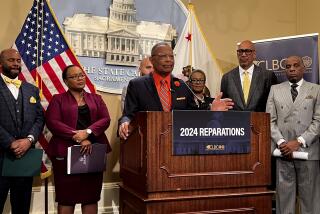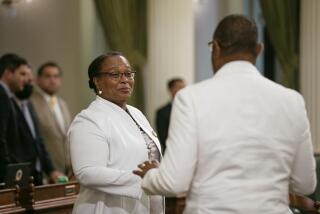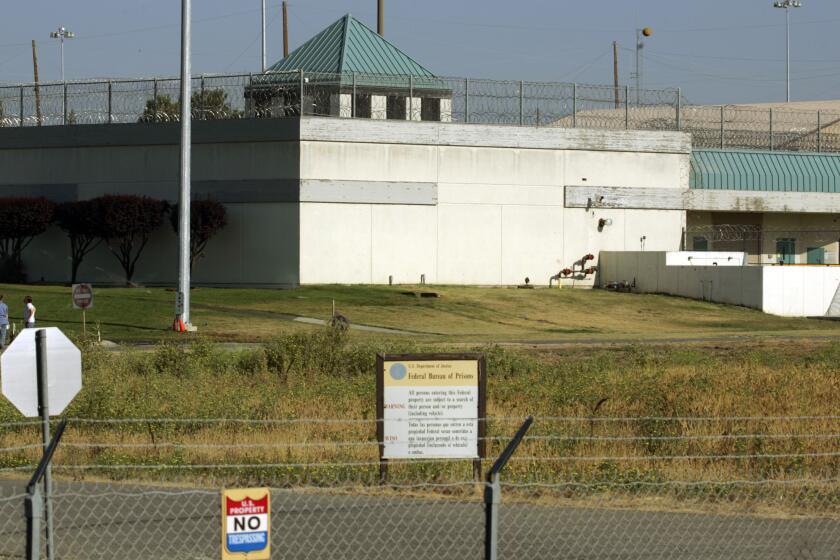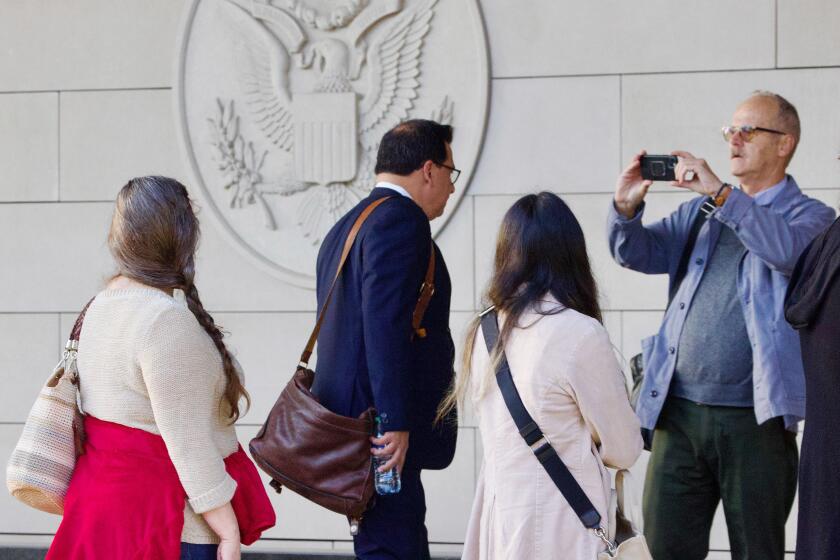L.A. creates advisory commission to study reparations pilot program for some Black Angelenos
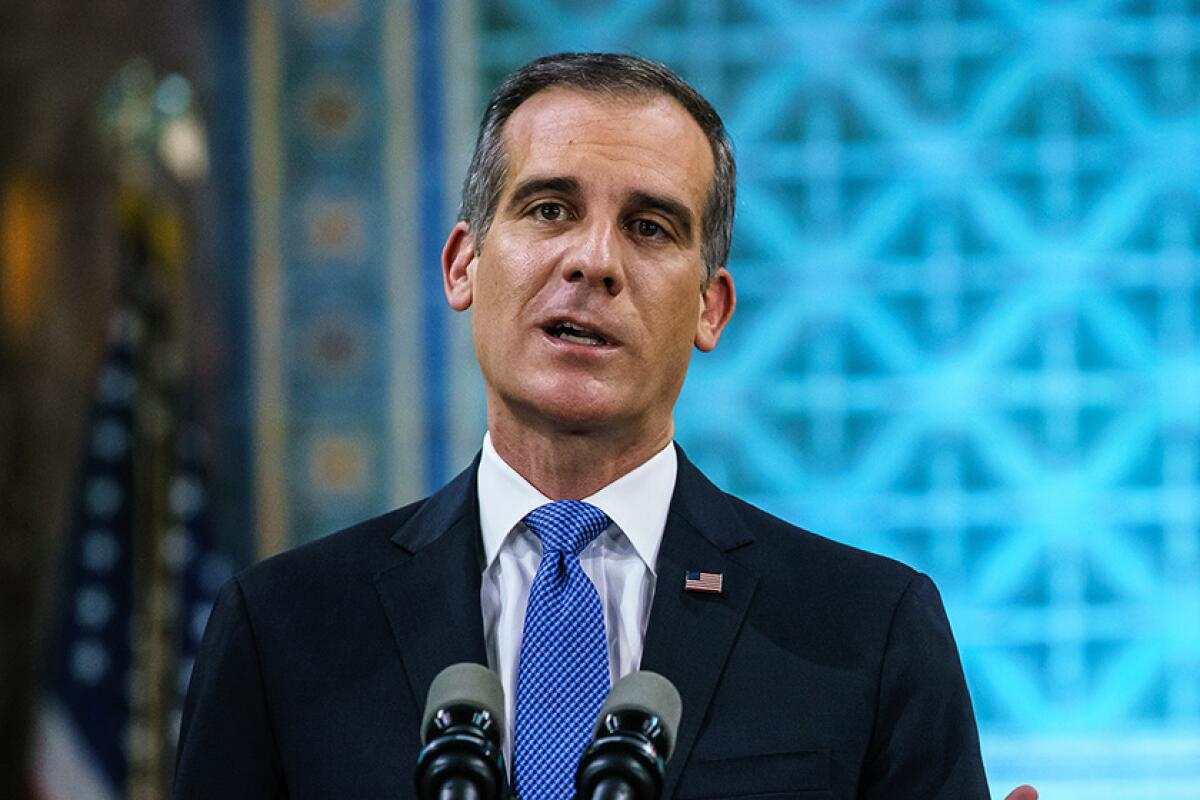
Los Angeles Mayor Eric Garcetti on Friday announced the formation of an advisory commission that would develop and advocate for a pilot reparations program targeted at a cohort of Black Angelenos.
The city had previously dedicated $500,000 to create a seven-person advisory committee to provide recommendations on how this group might be compensated and identify ways to fund it through public and private dollars. The commission will also identify an academic partner to help develop the pilot program.
In a Friday interview with The Times, Garcetti said many private entities, including Open Society Foundations, a grant network founded by billionaire George Soros, had expressed interest in being involved in funding.
Exactly who would benefit from a local reparations program and how any financial compensation would be made are details the commission would have to decide. Garcetti said he hoped corporations and banks would participate “to begin to make some amends and to push this movement forward.”
This would not be an outlet for these institutions to “buy forgiveness but to reckon with a complicity that we saw in American capitalism, slavery and post-slavery racism,” Garcetti said.
Council member Mark Ridley-Thomas said in a statement that reparations “will not undo the decades of historic injustices, but we cannot move forward unless we are intentional about identifying solutions to advance racial equity.”
Garcetti’s announcement came one day after President Biden signed a bill that made Juneteenth a national holiday to commemorate the moment a Union general told enslaved Black Americans in Galveston, Texas, that the Civil War had ended and emancipation was a reality.
The commission members, which were named by Garcetti and Black City Council members, are Michael Lawson, a former ambassador and head of the Los Angeles Urban League; Khansa Jones-Muhammad, co-chair of the Los Angeles chapter of the National Assembly of American Slavery Descendants; Mandla Kayise, an expert on economic and land use development; Cheryl Harris, a leading scholar of critical race theory and systemic discrimination at UCLA School of Law; Katrina VanderWoude, president of Los Angeles Trade-Technical College; Charisse Bremond-Weaver, president and chief executive of Brotherhood Crusade; and Mark Wilson, founding executive director of the Coalition for Responsible Community Development.
Garcetti said the L.A. advisory commission will not look at “all racism” but will “look specifically at reparations around where laws held back” Black Angelenos’ ability to build wealth.
Garcetti also announced the creation of the National Coalition of Mayors Organized for Reparations and Equity. The 11 mayors from cities including Denver, Austin, Texas, St. Paul, Minn., and Sacramento committed to establishing advisory commissions in their own cities that would also explore the creation of pilot programs.
Awarding reparations to people descended from American slaves has been heralded as a way to close the wealth gap that persists between Black and white Americans.
In Los Angeles, white households have a median net worth of $355,000 while Black households have a median wealth of $4,000, according to “The Color of Wealth in Los Angeles,” a 2019 report jointly published by Duke University, the New School, UCLA and the Insight Center for Community Economic Development.
Scholars blame this gap largely on racist federal and local policies that throttled Black people from accumulating wealth for decades.
For example, homeownership is the primary way white middle-class Americans were able to accumulate and pass down wealth for decades. For decades, the Federal Housing Administration refused to insure mortgages for homes in Black neighborhoods and subsidized builders who mass-produced subdivisions for white buyers as long as developers promised to not sell newly built homes to Black families.
Multiple efforts to award reparations for the descendants of American slaves have been unsuccessful since after the Civil War. Attention to the debate was renewed amid Black Americans’ disproportionate suffering amid the COVID-19 pandemic and after last year’s protests over the Minneapolis police killing of George Floyd and centuries of systemic racism.
This spring, Evanston, Ill., became the first city in the nation to approve reparations for some Black residents. The program awarded qualifying Black residents grants up to $25,000 for home down payments or repairs.
Experts like William Darity, a professor of public policy at Duke University, called the Evanston initiative a housing voucher program, not reparations.
In September, California became the first state to adopt a law to mandate a study and develop proposals for potential reparations to descendants of enslaved people and those affected by slavery.
Garcetti acknowledged the cities’ pilot programs would not close the gap but said it would be a model for the federal government.
The programs would “help the national government not just have an abstract conversation” about reparations but show “real quantitative and qualitative measures that come out of doing a pilot for a couple of years,” Garcetti said.
Darity told The Times that cities should establish what the federal government can glean from a local pilot program that it cannot get from past reparations initiatives.
In 1988, for example, the federal government paid reparations to Japanese Americans who were imprisoned during World War II. It could also look to Germany’s payments to Holocaust victims, Darity said.
It’s a “good idea in principle, but Los Angeles will not be able to model, specifically, the effects of closing the racial wealth gap across its entire Black population,” Darity said.
Reparations have also been done at the state level.
Florida in 1994 paid reparations to those who survived the 1923 Rosewood massacre, in which white mobs destroyed a Black community and killed at least six people.
Former Stockton Mayor Michael Tubbs, who is an emeritus member of the cities coalition, told The Times that an effort like this is important because “mayors help drive the national policy conversation and were willing to test this at a rate faster than Washington.” He highlighted universal basic income programs in Stockton, Compton and Los Angeles.
In the last few years, Los Angeles launched a cannabis effort many initially heralded as a kind of reparations for the war on drugs that led to the desperate incarceration of Black people. The program has been criticized by advocates who said it ended up hurting hundreds of people who took financial risks trying to nab a limited number of licenses.
L.A.’s reparations advisory commission will have to answer many questions surrounding funding and eligibility.
Which Black people should be awarded reparations is fiercely debated.
Some, like Darity, believe only African Americans, those who descend from people enslaved in the United States, should be given reparations because it was that group that was promised 40 acres and a mule after the Civil War.
“That’s a promise that was never kept, and it’s had repercussions across generations,” Darity said.
Others highlight that racist American policy has inhibited all Black Americans, regardless of ethnicity, from building wealth.
This initiative is, however, leagues beyond what has happened in Washington.
This spring, a measure that mandates a federal study of a reparations program moved out of a House committee but has not yet gotten a floor vote. Both House Speaker Nancy Pelosi (D-San Francisco) and Biden have expressed interest in studying the issue. Even if the measure passes the House, it has to pass the evenly divided Senate. No Republicans have co-sponsored the Senate version; 10 are needed to bypass the filibuster.
More to Read
Start your day right
Sign up for Essential California for news, features and recommendations from the L.A. Times and beyond in your inbox six days a week.
You may occasionally receive promotional content from the Los Angeles Times.

